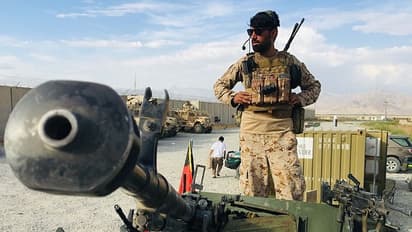Wary of Taliban attacks, air-defense systems come up at Kabul airport

Synopsis
The Taliban's increasing offensive attacks over the country have raised concerns about the security of the capital and its airport.
With the Taliban steadily gaining ground in Afghanistan ever since the US-led coalition troops packed their bags and left the country, a desperate Afghan government has been forced to put up air-defence systems at Kabul airport to counter rocket attacks.
The decision to set up air-defence systems at Kabul airport came amid the government's denial of the Taliban's claim. Nevertheless, the Taliban's increasing offensive attacks over the country have raised concerns about the security of the capital and its airport.
Afghanistan's interior ministry said that the newly installed air defence system had proven useful worldwide in repelling rocket and missile attacks. Officials, however, did not divulge the type of system that has been installed.
There have been regular and increasing attacks using rockets and mortars at government forces in the countryside. Another terrorist organisation, the Islamic State, carried out similar strikes on the capital last year. It also claimed responsibility for the rocket attack on the Bagram Airbase earlier this year, the biggest US military base in the country. The base was handed over to Afghan forces after the coalition troops withdrew.
Media reports said that over time US military had installed many C-RAMs (Counter Rocket, Artillery and Mortar Systems) across its bases to destroy incoming attacks.
Turkey has promised to provide security to Kabul once US and NATO troops exit next month. President Recep Tayyip Erdogan said that the US and his country had agreed on the 'scope' of how the airport will be managed under Turkish forces.
Since the beginning of May, the US troops began withdrawing from Afghanistan, and the Taliban have increased the number of attacks across the country, especially in the northern and western provinces.
On Sunday, India evacuated diplomats as the situation deteriorated, and its foreign ministry said that it was pulling staff from its consulate in Kandahar. The Taliban and Afghan forces are fighting on the edge of the city; around 50 Indian personnel and six diplomats were brought back to their countries. The consulate, though, remains open.
India is among many countries recalling diplomats. Russia announced last week that it had closed its consulate in the northern city of Mazar-i-Sharif, and China had called 210 nationals back from Afghanistan.
The fighting between the Afghan forces and the Taliban has led to the deployment of militiamen by warlords to counter attacks. In Herat, where the Taliban captured a border crossing with Iran, warlord Ismail Khan has mobilised his fighters in the city.
Pakistan's envoy to Kabul called on the international community to help the situation and the country's security forces and warned that deploying militia to fight the Taliban could worsen the situation. The envoy, Mansoor Ahmad Khan, said that if things translate into some kind of warfare between militias and Taliban, it will be dangerous.
"It is important that the Afghan government's capacity to defend these attacks and these security challenges is strengthened," he said.
The Afghan government has dismissed the Taliban's occupations as having not much strategic value, but the border crossings seized will give the group a new source of revenue. The terrorist group has gone around the northern part of the country, and the government is holding on to a few provincial capitals that require a large number of supplies and stronger security.
Check the Breaking News Today and Latest News from across India and around the world. Stay updated with the latest World News and global developments from politics to economy and current affairs. Get in-depth coverage of China News, Europe News, Pakistan News, and South Asia News, along with top headlines from the UK and US. Follow expert analysis, international trends, and breaking updates from around the globe. Download the Asianet News Official App from the Android Play Store and iPhone App Store for accurate and timely news updates anytime, anywhere.